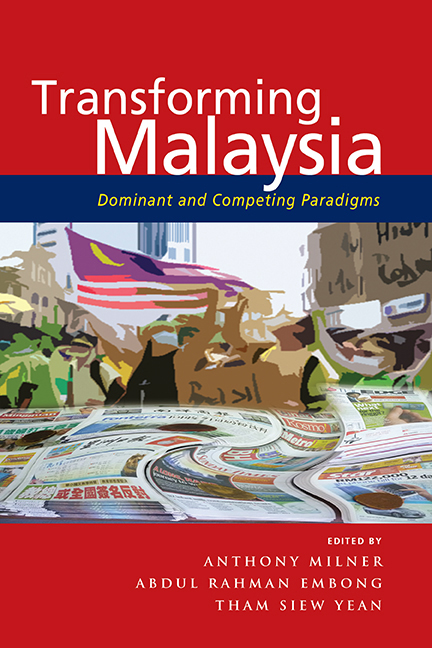Book contents
- Frontmatter
- Contents
- List of Tables and Figures
- Preface
- Acknowledgements
- List of Contributors
- 1 Introduction
- 2 Race and Its Competing Paradigms: A Historical Review
- 3 Knowledge Construction, the Rakyat Paradigm and Malaysia's Social Cohesion
- 4 Race Paradigm and Nation-Building in Malaysia
- 5 Race-Based Paradigm in Poverty Eradication and Income Distribution Analysis and Policy
- 6 Foreign Workers in Malaysia in the Post-Independence Era: Race Paradigm in State Policy, Academic Writings and Public Discourse
- 7 Trade Policy Formulation in Malaysia: Navigating between the Economic and Race Paradigms
- 8 National Security Conceptions and Foreign Policy Behaviour: Transcending the Dominant Race Paradigm?
- Index
4 - Race Paradigm and Nation-Building in Malaysia
Published online by Cambridge University Press: 21 October 2015
- Frontmatter
- Contents
- List of Tables and Figures
- Preface
- Acknowledgements
- List of Contributors
- 1 Introduction
- 2 Race and Its Competing Paradigms: A Historical Review
- 3 Knowledge Construction, the Rakyat Paradigm and Malaysia's Social Cohesion
- 4 Race Paradigm and Nation-Building in Malaysia
- 5 Race-Based Paradigm in Poverty Eradication and Income Distribution Analysis and Policy
- 6 Foreign Workers in Malaysia in the Post-Independence Era: Race Paradigm in State Policy, Academic Writings and Public Discourse
- 7 Trade Policy Formulation in Malaysia: Navigating between the Economic and Race Paradigms
- 8 National Security Conceptions and Foreign Policy Behaviour: Transcending the Dominant Race Paradigm?
- Index
Summary
INTRODUCTION
In Malaysia, usage of the term “race” is widespread, and is mixed with some form of uncritical, stereotypical cultural explanation of racial differences. In this sense, as argued in the Introduction, it is apt to describe the functioning of the Malaysian society as dominated by the paradigm of race. In scholarly works, the term “ethnicity” is often preferred, due to the awareness of the inherent conceptual fallacy of the biological basis of “racial differences”. In addition, the concept of ethnic identity could easily integrate the religious dimension, while it would be a misnomer to speak about the religious dimensions of a “race”. Nonetheless, simply replacing the word “race” with “ethnicity” does not necessarily mean that the user of the term “ethnicity” may view ethnic phenomenon with a more critical, theoretically informed perspective, as what many so-called “plural society theorists” are accused of. It is equally easy to fall into the trap of “essentialising” ethnicity, to regard it as immutable or given. For instance, referring to the emergence of “ethnic paradigm”, Shamsul (1998) was critical of academic knowledge and discourse which is “trapped in the ethnic-oriented plural society frame” (p. 41).
Is the prevalence of race paradigm in a society necessarily a hindrance to nation building? Eriksen (1998) who examined the multiethnic Mauritius society did not think so. Perspective on Malaysia, on the other hand, is mitigated. On the one hand, Malaysia is perceived internationally as a country which has successfully maintained political stability and peace. The government highlighted the fact that among Asian countries, Malaysia ranks only second to Japan in 2011 in terms of the Global Peace Index which assesses the degree of peacefulness, security and presence/absence of internal violent conflicts among nation-states (“National unity: ‘M'sia ranks second after Japan”, Malaysiakini, 18 June 2011). At a constitution-drafting conference in Khartoum, Sudan in May 2011, Malaysia was reportedly highlighted as a model, a moderate, progressive and ethnically harmonious Muslim-majority country (Shad Saleem Faruqi, “Spirit of Moderation Animated”, The Star, 1 June 2011). On the other hand, there is a general recognition among many scholars that ethnic division constitutes a formidable force in shaping national policies and was disruptive of forging national consensus.
- Type
- Chapter
- Information
- Transforming MalaysiaDominant and Competing Paradigms, pp. 82 - 110Publisher: ISEAS–Yusof Ishak InstitutePrint publication year: 2014

